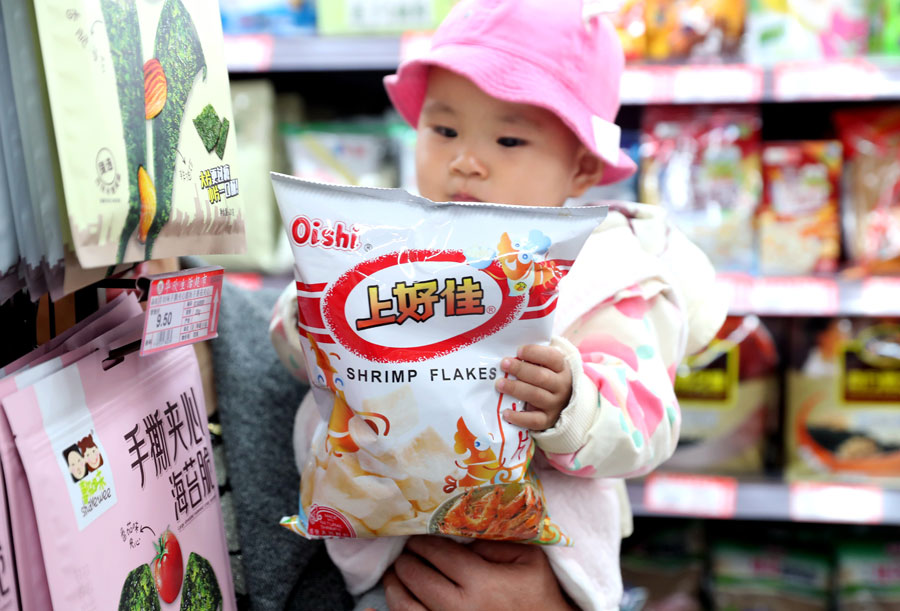Snack king retains appetite for building bridges


Humble beginnings
The company's story began in 1946, when Chan was age 5. His parents, immigrants from South China's Fujian province, founded Liwayway Marketing Corp in Manila, capital of the Philippines.
The company started by repackaging products such as coffee and cornstarch. Then it began producing goods for the local snack market. In the 1970s, it graduated to producing Oishi Prawn Crackers, making the company a market leader in the local industry.
The Chan family maintained its Chinese roots, and Carlos was raised in a traditional setting that was heavily immersed in Confucianism. The idea of contributing to the land of his ancestors was deeply planted.
Chan attended Chinese schools in the Philippines, so he is fluent in both spoken and written Chinese, and has even given himself a Chinese name, Shi Gongqi.
Initially, he dreamed of becoming a painter. He was majoring in architecture in college but as the eldest son, he dropped out to help with the family's growing business.
Chan got his first glimpse of Shanghai via the movies he watched as a child in which he saw the city as a lively, vibrant place that would be ideal for business.
He'd been considering entering the Chinese market since the mid-1980s. Ten years after Liwayway produced its first bag of Oishi prawn crackers it was facing increasing competition from local rivals and needed to address the problem.
However, Chan received little encouragement from people who knew the Chinese market, or thought they did.
"Many told me that it would be hard to profit from the Chinese market. People there were poor," Chan said. "'So you mean they don't even have 1 or 2 yuan?' I asked everyone who gave my go-to-China proposal the red light."
Reluctant to quit, Chan decided to see for himself. He was determined to crack the Chinese market, so he started making regular visits to Shanghai in the late '80s.
There were no direct flights from Manila to Shanghai, so he had to change planes in Hong Kong and he was often the only passenger in business class. His first real experience of Shanghai was a disappointment.
"It was underdeveloped. The roads were shabby and people all wore the same color - blue," he said. However, he hung on and learned about the local market and China's legal system.
Recalling his first days in Shanghai, Chan said one of his most memorable moments was the time he drove his Mercedes-Benz in the city shortly after opening his plant.
"There were few cars on the road at that time, let alone luxury cars. You could feel people's eyes all fixed on you. "Now, things are different. I see many other cars on the roads in Shanghai. The city has advanced a lot," he said.
Last year, Shanghai became the first city in China to generate GDP of 3 trillion yuan ($433 million), and is on its way to becoming one of the world's major financial centers by 2020.

Following its success in China, Liwayway has expanded its snack business to other markets, including Myanmar, Thailand, Indonesia, Cambodia, India and South Africa.
"My roots are in China, but the Philippines is my home, too. It has accommodated my family and provided opportunities for us to thrive," he said.
His love for both countries prompted him to act as a bridge between China and the Philippines.
Three presidents of the Philippines, including incumbent Rodrigo Duterte, have named Chan to the post of special envoy to China.
Talking about that role, Chan said his main task is to bring the two countries closer together.
He has initiated numerous sisterhood pacts between provinces and cities in the countries, including Bohol in the Philippines and Jiangxi province in China, Cavite and Anhui province, and Palawan and the Ningxia Hui autonomous region.
After a deadly magnitude 8 earthquake struck Sichuan province in Southwest China in May 2008, Chan donated 13 million yuan to the area, including Oishi Shanghaojia products worth 1 million yuan.
He also aided the recovery of 100 high school students from the area by paying for them to visit the Philippines.
"Life is short. Live it not only for yourself, but also for society when you are able," he said.
The snack tycoon - now age 77 and with seven grandchildren - spends half the year in Manila and half in Shanghai.
He is still a man of few words, but he generates a lot of action and is ultra-energetic when it comes to expanding Liwayway's footprint because it means he can continue to make a major contribution to both his company and China.
























